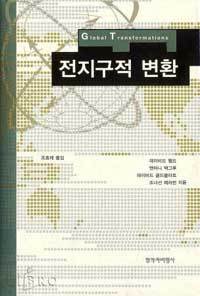Global Transformation

Global Transformation, by David Held, et al., translated by Cho Hyo-jeh
888 pages, \40,000, published by Creation and Criticism Co.
Globalization, which symbolizes collapse of the borders in politics, economy and culture, represents a broad understanding that a development of one region may bring about a significant consequence in the life of an individual or a community on the other side of the globe. It definitely means that there is certain limitation in the approach or the system based on a single country.
This concept began to be used from 1960s in France and the United States. Now, it has become a word daily used around the world. Although the concept of globalization has remarkably elevated its crucial influence, studies on it have been made centered only around the economic and cultural aspects of it so far. Deeply aware of these issues, four British scholars have dedicated 10 years to finding out solutions. They are the co-authors of this book: David Held (Political science), Anthony McGrew (international relations), David Goldblatt (sociology) and Jonathan Perreton (economics).
The authors widen the concept into 8 fields: politics, military, trade, finance, production, immigration and environment. Then, they study each field from the ancient times to the present. Through this analysis, they exam the effects of globalization on each field and the correlation between them. Then, they move on to track down on the logic of development for the idea itself, which in turn has been derived from the correlation.
This comprehensive study helps us classify short-term features and long-term trends of globalization, and set each stage of changes of globalization through the cultural survey. At the same time, by means of historical comparison, it helps us comprehend the nature of the ongoing globalization.
Observer`s editor commented, "This book contains the most thorough, sophisticated and authentic study among the ones done so far about globalization." This joint study, based on a huge collection of literature and analysis thereof, exemplifies what it means to be an interdisciplinary study, an achievement that Korean scholars have been only dreaming of.
One more thing that stands out is the academic dedication of the translator, who is a professor of NGO. The translator, to make up for the time gap between the original publication and the translated edition, has augmented the translated version with a supplement published after the Sep. 11th attack in 2001, and attaches as appendices a glossary and abbreviation tables regarding globalization and methodology.
In 2000, the translator published a translation titled Age of NGO, outlining the issues and tasks facing NGO activities. For the past 18 months, he has dedicated himself to translation of this tome. He says, "Korean scholars usually talk about volume. I have only thought about quality while working on this book."
This book is a part of the long-term project of Professor Cho Hyo-jeh about NGO, globalization, society of global citizens and human rights. Looking forward to what would come out next time.







